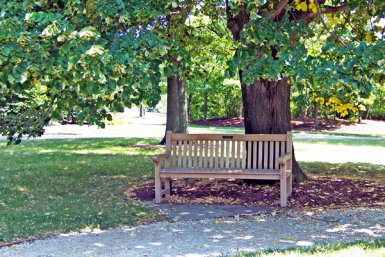Leçon 5 - Le Présent de l'indicatif
Introduction
Cette leçon présente le présent de l'indicatif des verbes en anglais. Le temps présent du verbe irrégulier très commun have est également montré. Cette leçon présente également les mots en anglais pour les couleurs. Des flashcards sont incluses pour vous aider à apprendre ces mots très communs.
Une courte conversation est incluse dans la leçon pour vous aider à apprendre à parler anglais dans des situations quotidiennes.
Conversations

English
Ashley and Eric are sitting on a bench in a park enjoying a warm summer day.
Eric: What a beautiful day!
Ashley: Yes. I can't believe how warm it is.
Eric: Look at all the people walking around the park.
Ashley: I hear that it is going to rain tomorrow, so people are taking advantage of the nice weather.
Eric: Well, as much as I enjoy sitting in the sunshine, I am getting very hungry.
Ashley: You're not the only one. Let's go.
Eric and Ashley stand up and walk towards the restaurant.
Français
Ashley et Eric sont assis sur un banc dans un parc, profitant d'une journée d'été chaleureuse.
Eric: Quelle belle journée!
Ashley: Oui. Je ne peux pas croire à quel point c'est chaud.
Eric: Regardez toutes les personnes qui se promenent autour du parc.
Ashley: J'entends que ça va pleuvoir demain, afin que les gens profitent du beau temps.
Eric: Eh bien, autant que j'aime assis dans le soleil, j'ai très faim.
Ashley: Tu n'es pas le seul. Allons-y.
Eric et Ashley se lèvent et marchent vers le restaurant.
Vocabulaire et Phrases
 to sit
to sit
|
s'asseoir |
 park
park
|
parc |
 to enjoy
to enjoy
|
jouir |
 warm
warm
|
chaud |
 summer
summer
|
été |
 What a beautiful day!
What a beautiful day!
|
Quelle belle journée! |
 I can't believe
I can't believe
|
Je ne peux pas croire |
 to walk
to walk
|
marcher |
 It is going to rain tomorrow.
It is going to rain tomorrow.
|
Il va pleuvoir demain. |
 sunshine
sunshine
|
ensoleillement |
 tomorrow
tomorrow
|
demain |
 to take advantage of
to take advantage of
|
prendre avantage de |
 weather
weather
|
conditions météorologiques |
 I am getting very hungry.
I am getting very hungry.
|
J'ai très faim. |
 Let's go.
Let's go.
|
Allons-y. |
 restaurant
restaurant
|
restaurant |
Annonce
Colours Les Couleurs
Note: colour (UK spelling), color (US spelling).
 Yellow
Yellow
 Blue
Blue
 Navy Blue
Navy Blue
 White
White
 Grey
Grey
 Brown
Brown
 Orange
Orange
 Black
Black
 Purple
Purple
 Red
Red
 Pink
Pink
 Green
Green
 Light Green
Light Green
 Magenta
Magenta
 Cyan
Cyan
Grammaire
Verbs - Present Tense
Un verbe est un mot qui exprime une action, une condition ou un état d'être. Les verbes en anglais ont différentes formes pour indiquer si l'action s'est produite dans le passé, se produit actuellement ou se produira dans le futur. Le present tense d'un verbe est utilisé pour indiquer qu'une action, une condition ou un état est :
- actuellement en cours
- un fait ou une vérité générale
- habituel, quotidien ou prévu pour une durée indéterminée dans l'avenir.
To Walk (Marcher, Se Promener)
 I walk
I walk
|
je marche |
 you walk
you walk
|
tu marches, vous marchez |
 he walks
he walks
|
il marche |
 she walks
she walks
|
elle marche |
 it walks
it walks
|
il marche, elle marche |
 we walk
we walk
|
nous marchons |
 they walk
they walk
|
ils marchent, elles marchent |

Exemples
 I see the cup.
I see the cup.
|
Je vois la coupe. |
 She reads the book.
She reads the book.
|
Elle lit le livre. |
 They think he is wrong.
They think he is wrong.
|
Ils pensent qu'il a tort. |
 We believe you.
We believe you.
|
Nous vous croyons. |
 He sings a song.
He sings a song.
|
Il chante une chanson. |


Verbs - Present Progressive Tense
En anglais, il y a aussi le present progressive tense, aussi appelé le present continuous, pour indiquer qu'une action est en train de se produire dans le présent. Il est utilisé pour souligner qu'une action se déroule en ce moment même, ou qu'elle se déroule maintenant mais seulement pour une courte durée.
Le present progressive tense est formé en utilisant be avec le verbe, et en ajoutant ing à la fin du verbe. Par exemple I am walking. Les contractions sont souvent utilisées dans ce cas. Par exemple I'm walking.
 I am walking
I am walking
|
je marche (en ce moment) |
 you are walking
you are walking
|
tu marches, vous marchez (en ce moment) |
 he is walking
he is walking
|
il marche (en ce moment) |
 she is walking
she is walking
|
elle marche (en ce moment) |
 it is walking
it is walking
|
il marche, elle marche (en ce moment) |
 we are walking
we are walking
|
nous marchons (en ce moment) |
 they are walking
they are walking
|
ils marchent, elles marchent (en ce moment) |
Exemples
 I'm walking to the store.
I'm walking to the store.
|
Je marche au magasin. |
 He's opening the door.
He's opening the door.
|
Il ouvre la porte. |
 It's raining.
It's raining.
|
Il pleut. |
 We're waiting for you.
We're waiting for you.
|
Nous t'attendons. |


To Have (Avoir)
Have est un verbe très courant qui est irrégulier au présent. Le tableau suivant montre les formes du verbe have au présent.
 I have
I have
|
j'ai |
 you have
you have
|
tu as, vous avez |
 he has
he has
|
il a |
 she has
she has
|
elle a |
 it has
it has
|
il a, elle a |
 we have
we have
|
nous avons |
 they have
they have
|
ils ont, elles ont |
Exemples
 I have an apple.
I have an apple.
|
J'ai une pomme. |
 She has black shoes.
She has black shoes.
|
Elle a des chaussures noires. |
 We have a new table.
We have a new table.
|
Nous avons une nouvelle table. |
 You have a nice house.
You have a nice house.
|
Vous avez une belle maison. |
 He has a blue car.
He has a blue car.
|
Il a une voiture bleue. |
 They have a grey cat.
They have a grey cat.
|
Ils ont un chat gris. |


Annonce
Lire l’anglais
The day is warm and sunny. The sky is blue with a few white clouds. Mark walks along the shore, looking at the waves on the ocean and the boats in the distance. He hears people laughing. He turns to look and sees a family walking a black dog. Mark waves at the family, then walks towards a café he sees in the distance. He climbs up some stairs and walks along the grey sidewalk until he reaches the café. He enters the café and walks up to the counter.
"What would you like?", asks a lady with long, brown hair.
"How much are the muffins?", Mark asks.
"Two dollars and fifteen cents," she replies.
"A blueberry muffin and a large coffee please."
"That's four dollars and twenty cents," she says as she pours the coffee.
Mark pays the lady, then brings his coffee and muffin to a table outside. He takes a sip of his coffee as he looks at the ocean.
Vocabulaire anglais
| day | jour |
| sunny | ensoleillé |
| cloud | nuage |
| sky | ciel |
| wave | vague |
| ocean | océan |
| distance | distance |
| hears | entend |
| turns | se tourne |
| sees | voit |
| family | famille |
| waves | salue |
| climbs | grimpe |
| sidewalk | trottoir |
| reaches | atteint |
| enters | entre dans |
| What would you like? | Que désirez-vous? |
| asks | demande |
| hair | les cheveux |
| replies | réponses |
| says | dit |
| pours | verse |
| pays | paye |
| brings | apporte |
| table | table |
Flashcards
Voici quelques cartes mémoire pour vous aider à apprendre les mots anglais pour certaines couleurs courantes.
Practice
Appuyez sur l'icône audio, puis écrivez le mot ou la phrase en anglais que vous entendez. Appuyez sur le bouton Vérifier pour voir si vos réponses sont correctes.

|
|

|
|

|
|

|
|

|
|

|
|

|
|

|
|

|
|

|
Quiz
Voici un bref examen en ligne qui vous aidera à apprendre le vocabulaire anglais inclus dans cette leçon.

